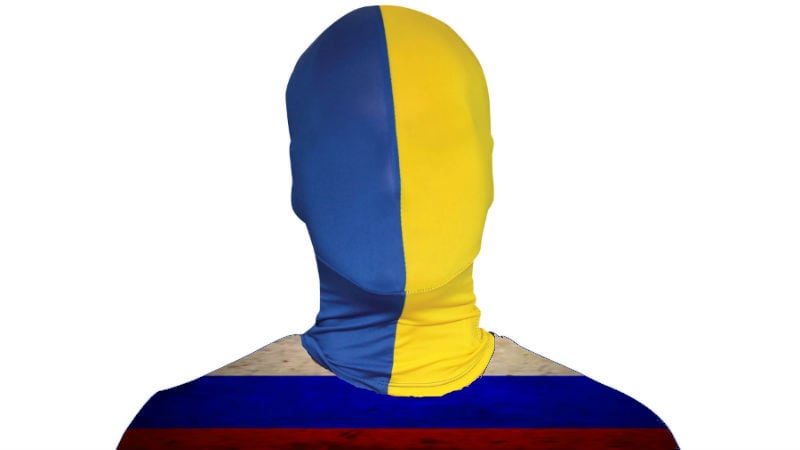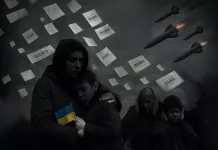
Russia has engaged in a blitzkrieg of information warfare since the start of the Euromaidan protests, increasing the budget of RT (formerly Russia Today) by 41%, and creating a new international news operation called Sputnik to “provide an alternative viewpoint on world events.” More and more, though, the Kremlin is manipulating the information sphere in more insidious ways.
Last week, the Russian daily “Delovoi Petersburg” (DP) broke a story that revealed a number of news sites supposedly operating out of Ukraine, such as the “Kharkov News Agency,” are actually housed, operated, and staffed in Russia without any local correspondents. This new kind of information warfare is being waged from a nondescript building on 55 Savushkina Street in St. Petersburg, just down the hall from the Kremlin’s infamous St. Petersburg Troll Den. Photos of the building quickly spread through the RuNet.
Савушкина 55 Новый домик для ботов. Пропускная система. Ни одной вывески. Чье фото – не скажу. pic.twitter.com/oCVUAvSTW4
— Ходорковский Михаил (@mich261213) November 7, 2014
Savushkina 55. New home for the bots. Security pass system. Not a single sign. I won’t share who took the photo.
In June, BuzzFeed published a detailed feature on this operation, through which the Kremlin supposedly funds a small army of young web-savvy Internet users who flood website comment sections around the world with pro-Russian and anti-Western rhetoric.
The slant of the stories that the ghost-writing army running ‘Ukrainian’ news sites publishes is exclusively pro-Russian. For instance, recent headlines on the Kharkov News Agency site include “Kharkov, unemployment: How to survive after Maidan” and “The ‘protectors’ of Ukraine arrested for robbery in Kiev.” According to LiveInternet statistics, over 200 thousand users have visited the website in the last month.
Even though these ‘Ukrainian’ sites claim to be local, the DP correspondents had no luck finding anyone working for the sites outside of the walls of the St. Petersburg office. The listed address for the supposed Kharkov office is a dead-end: the neighboring businesses in the office space swear that this publication does not operate nearby.
After some impressive detective work, the sleuths at DP found that an outlet called Neva News, run from the 55 Savushkina office, bought the Kharkov News Agency’s domain name on August 25, 2013. The CEO and co-owner of Neva News, Evgenii Zubarev, confirmed DP’s findings, but insisted that the location of the outlet’s hosting or newsroom does not affect its editorial policy.
Zubarev is far from an isolated figure, as he heads up the Federal Agency News (FAN) project, which is also based out of—tell us if you’ve noticed a pattern yet—55 Savushkina.
Additionally, a series of news portals supporting pro-Russian separatists in Eastern Ukraine, such as novorus.info, newsdon.info, and newslava.info, are also operating out of Moscow while providing ‘local’ news on the Donbass region. Newslava.info reports being based in Sevastopol on 2 Lenin Street, but, as a quick Google search will reveal, this address is for the city government offices.
As it turns out, these websites are supported and run by Moscow businessman and hotelier Andrei Surkov, who says he only funds about 70% of the sites’ work, and the rest comes from public donations. Surkov himself is publishing a book entitled “Guard of the Steel Emperor: The Secret Origin of the Russian People,” detailing how the Russian people are actually descendants of the Aryan race and the guards of Genghis Khan.
While there is no direct link between the Kremlin and any of these projects—both Surkov and Zubarev say their projects are privately funded—the timing, scale, and coordination of these efforts are suspicious. BuzzFeed was not able to find evidence of direct government funding to the “Internet Research Agency,” the pro-Kremlin troll outlet operating out of 55 Savushkina, but they did reference a number of sources that revealed some level of involvement.
Over the last months, the epicenter of the grand Russian disinformation campaign against Ukraine has come into clear focus, with all paths converging on a four-story office building just off the Bolshaya Nevka River. While it’s true the Internet is still the freest media platform, it is also one that allows for ambiguity and manipulation. As the lines between private enterprise and public funding in Russian media blur, Kremlin-supported trolls and astroturfers seem bent on making the work of independent journalists and civic activists increasingly difficult.
By Aric Toler, Global Voices





